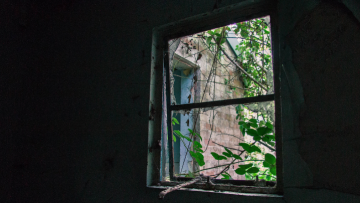
Leanne’s Story: Escaping domestic violence, being a single mum of 2, and choosing a path out
Nov 19, 2020
Leanne was living in a nice unit at New Farm, an inner city suburb in Brisbane, with her partner and child when suddenly life took an unexpected turn. Her partner left in the middle of the night, leaving her with all of the bills. As a single mum with no job, she was no longer able to afford living in her New Farm unit.
Desperate to keep her child off the streets, Leanne ended up in a derelict house with broken stairs and holes in the floorboards. “It was a dump, but it was all I could afford,” says Leanne. “It was the kind of house where I had to actually sleep with my son because there would be rats crawling on him at night.”
After a few years of living there, the owner sold the property and Leanne was once again left without a home. That’s when she turned to the Department of Housing for help. “I put myself on a public housing list and was offered a place to live in one of the first buildings in Kelvin Grove.”
With a roof over her and her son’s head, Leanne started to get back on her feet and got a part-time job as a nursing assistant – but then things got worse. “After seven years on my own, I met someone who I thought was going to be the love of my life. When you’re young, you do really dumb things like fall in love with the wrong person.”
Leanne ended up in a domestic violence relationship with a new baby. “I was 40-something when I had my second child, so I gave up work to do that. I ended up trapped here. I didn't have a full-time job and it was hard to find somewhere else. Things got quite crazy and I lost a lot of money. He took a lot of money off me.”
A fresh start
After her ex-partner was extradited to New Zealand, Leanne was ready to start fresh as a single mother of two. “At first it was great. There were a lot of other single mums living in the building, so we used to look after each other’s kids and help each other out. It was really nice.”But even with social housing, market value has meant the rent has gone up every year, putting even more pressure on Leanne’s single income. “My rent is now 75% of my pay. When I first moved in it was $180 a week, and now it is $316 a week. This means that I'm left with $100 a week to spend on food, internet, phone, transport and school things for my son. I even have to split my rent payments between AusStudy and my family tax benefit, otherwise there would be one week where I have absolutely no money. It's quite awful really. It gives me no money to save to improve my circumstances.”
The government’s JobKeeper stimulus payments, introduced earlier this year to help businesses keep their staff employed, have been a godsend for Leanne. “It’s been a bit of a breather, from struggling day to day. We can actually have more food and things like that.”
But those payments will end soon, and Leanne will have to go back to splitting her rent.
The recent pandemic has also seen additional challenges, like the social stigma towards people living in public housing. “During the worst part of COVID, they housed a lot of homeless people in my building. People began mixing up social housing tenants with homeless people. There’s always articles in the paper saying, ‘We need to get rid of social housing in Kelvin Grove, it’s tearing down the neighbourhood.’ That's embarrassing. I don't tell people I live here, otherwise they think we need special help or something.”
Choosing a path out
All Leanne wants is a place to call home. “People say to me, why don’t you move out of there? But you know, my kids and I have a roof over our heads. I don't have a car, but I’m close to public transport, close to Woolworths. My support network is here, my doctor is here, my kids’ school is here. It’s not like I desperately want to stay here, but it’s hard to move house, and that costs a lot of money.”She’s a smart woman who works hard in the community, is studying for her second degree, and has even been the director of a company. Leanne says it’s never too late to get your life back on track. “I had some great jobs, I had a great resume. There are organisations out there that can sit down with you and give you guidance and advice. I got in touch with a debt management charity that helped me with my finances, put money aside for school shoes and Christmas. I paid off all my debts and basically don't really owe anything now.”
While Leanne is proud of her accomplishments, her advice to others would be to always think of the future and have good financial advice and guidance. “Women have taken their super through COVID, even the younger women, and I've said, ‘You need to make sure you’re building up your super, that you are using money to invest in things, whether it be a house or whatever.’ Don't buy a lot of depreciating assets like cars and things like that. Have someone to talk to regularly from the first time you start your first decent job, so that even when you move jobs or have a bad time, you've got a plan B. Or that your plan A is so good you don't need a plan B. Keep thinking and planning for that rainy day.
“My last five years have been absolutely awesome. I have taken every opportunity offered to me. To go from coming out of domestic violence to now with two degrees, a seat on a board, an amazing support network and great contacts. I volunteer for the Brisbane Festival every year because it’s a chance for my kids and I get to go to a lot of things. I work really hard to make that happen.”

